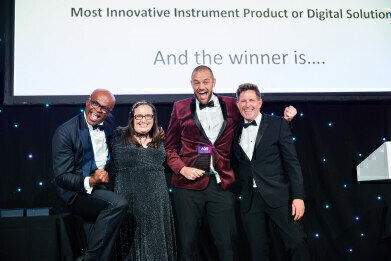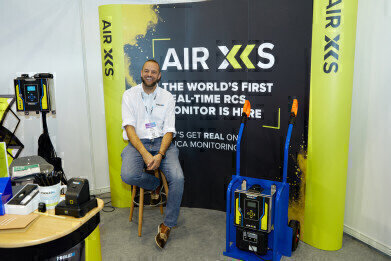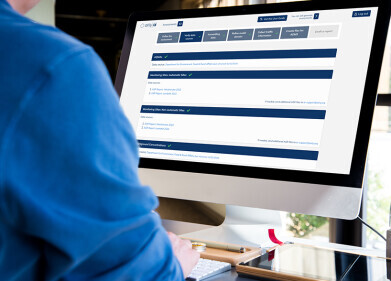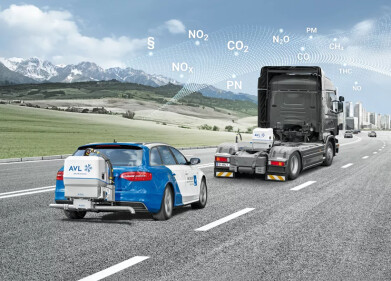Air Monitoring
First Real-Time Airborne Dust Monitor Awarded Prize at AQE 2022
Oct 25 2022
To listen to this interview, click here.
At this year’s Air Quality and Emissions (AQE) conference in Telford, a number of awards were given out for excellence in various aspects of air monitoring. To learn a little more about their products, partnerships and why they come to AQE, EnvirotechOnline took a walk around the exhibition floor to talk to some of the nominees.
We asked Glyn Pierce-Jones, CEO of Trolex, about their game-changing, real-time silica monitor, the Air XS, which won the award for Most Innovative Instrument, Product, or Digital Solution.
“Our history as a company is in gas detection. That’s what we’ve done for many, many years, and it’s still our biggest market. But around 8 years ago, we were looking at the Health and Safety Executive’s (HSE) statistics for harm and death in the UK and we noted something that was kind of shocking. Three of the top five causes of death and sources of harm to workers in industrial environments were particulates-based: asbestos, silica, and diesel particulates. The other two of were sunlight and shift-work. We thought: “Well, we can’t do a lot about sunlight or shift-work, but we might be able to do something about the particulates, because it’s quite close to what we do as a gas detection company.” Nobody seemed to be innovating and the number of deaths - 12,000 a year - is massive. Over 90% of all deaths that take place in the workplace are related to particulates. I mean, I couldn’t believe it. I thought there must be something wrong with these statistics, that’s five times as many people as die in road accidents. So, we looked into it more deeply, found that these were, in fact, probably under-estimations of the amount of harm that was being caused, and it was the same story all around the world. We were like: why is nobody solving this?
The simple answer is that the really dangerous particulates, silica and asbestos (which is just dust silica, it’s a silica compound), are really, really difficult to monitor for, and nobody can do it in real-time. Currently, the way it‘s done is you collect dust on a filter, you send that filter off to the laboratory, they analyse it and send you it back maybe a week or two weeks later, saying this is the amount of silica that was present. Well, we thought that was ridiculous. You know, in the gas detection field, you have instant readings, the detector lets you know there’s this much gas detected and whether to get out, put your mask on, switch the machine off - whatever action is needed. That’s how it should be in the dust monitoring field, too, particularly around these really dangerous dust-like silicas. So, we set out to solve the problem; the solution to that problem is the Air XS.
It took eight years, we invested nine million pounds, we set up our own bespoke laser laboratory, we brought experts in from around the world. Everyone said we couldn’t do it, they said it’s impossible, that companies have been trying to do this for decades, companies that are 100 times the size of you. We said: “Thanks for your advice, but we’re going to do it anyway.” And we did.
Essentially, we didn’t invent the technology, which is optical refraction technology, we brought it into this field for the first time and utilised it. Basically, we’re firing a beam at a particle and we’re looking at the refractive response. The refractive response of silica is completely unique, so that’s how we’re identifying silica in the air. For the first time, you can know in real-time how much respirable crystalline silica (RCS) is in the air, so that workers can be warned, told to evacuate, put their mask on, put on the ventilation or suppression system; people can understand exactly what’s happening in real-time as the situation changes. That’s why it’s a revolutionary product. What we hope is that in the next five to ten years, wherever there’s RCS present – which is the workplaces of half-a-million workers in the UK alone - there will be a real-time monitor present that will tell them that they are still under the legal limit. When they’ve reached the legal limit, it will tell them they need to get out!
In the medium-term, though, we want those legal limits of the most dangerous particulates to be brought down. For many years, the HSE has been clear that there’s no point in bringing the limits down, because there’s no accurate way of monitoring for the presence of these particulates. Of course, they were right about that, but there is now a way of monitoring for RCS in real time.
It‘s important to remember that there’s no safe level of RCS; however much you breathe in is dangerous. So, we should be looking towards bringing those levels down, and we could save thousands of lives every year. Silicosis is a horrible disease. We’ve met people throughout the development process who’ve suffered from it. It’s a very slow, painful, unpleasant death. Pretty much everybody seems to know somebody who’s been through that. Sometimes it’s diagnosed as COPD, sometimes lung cancer, but very often silica dust will have played a significant part in that disease process. So, we want to save thousands of lives and we hope the Air XS will do that.”
Next, we discussed Trolex’s time at AQE 2022 and why they find the show to be the right venue to promote their ground-breaking products.
“Look, it’s a great show. Our product is about the quality of the air and the environment in industrial settings, so it’s directly relevant to the people who come to AQE. A lot of our technology partners are here, as well, and our distribution partners, too, so we’re obviously looking for customers but also distribution partners. The show’s got a more international audience, too, and that’s important to us. We find it a really useful show for the quality of the people that come on the stand. What we want is people who are genuinely interested in the subject matter and this is spot-on in terms of that. It’s a great show for us.”
In 2024, AQE will return bigger and better, graduating to the National Exhibition Centre (NEC) in Birmingham. For information on exhibiting at AQE 2024, click here.
Digital Edition
IET 34.2 March 2024
April 2024
Gas Detection - Biogas batch fermentation system for laboratory use with automatic gas analysis in real time Water/Wastewater - Upcycling sensors for sustainable nature management - Prist...
View all digital editions
Events
Apr 30 2024 Melbourne, Australia
Apr 30 2024 Birmingham, UK
May 03 2024 Seoul, South Korea
May 05 2024 Seville, Spain
May 06 2024 Minneapolis, MN, USA



















